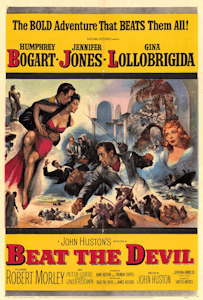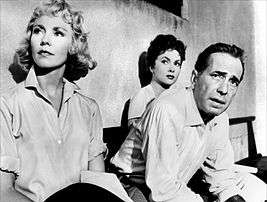Beat the Devil (film)
| Beat the Devil | |
|---|---|
 1953 film poster | |
| Directed by | John Huston |
| Produced by | John Huston |
| Screenplay by |
John Huston Truman Capote |
| Based on |
Beat the Devil by James Helvick |
| Starring | |
| Music by | Franco Mannino |
| Cinematography | Oswald Morris |
| Edited by | Ralph Kemplen |
Production company |
Romulus Films Santana Pictures |
| Distributed by |
British Lion Films (United Kingdom) United Artists (United States) |
Release date | 24 November 1953 (US) |
Running time | 89 minutes |
| Country | |
| Language | English |
| Box office | £115,926 (UK)[3] |
Beat the Devil is a 1953 adventure comedy film. The film was directed by John Huston, and starred Humphrey Bogart, Jennifer Jones and Gina Lollobrigida, and featured Robert Morley, Peter Lorre and Bernard Lee.[4] Huston and Truman Capote wrote the screenplay, loosely based upon a novel of the same name by British journalist Claud Cockburn, writing under the pseudonym James Helvick. Huston made the film as a parody of a genre of film. Although often described as a parody of The Maltese Falcon, which Huston directed and in which Bogart and Lorre appeared, this is not the case. Capote said, "John [Huston] and I decided to kid the story, to treat it as a parody. Instead of another Maltese Falcon, we turned it into a ... [spoof] on this type of film."[5]
The script, written on a day-to-day basis as the film was shot,[6] concerns the adventures of a motley crew of swindlers and ne'er-do-wells trying to claim land rich in uranium deposits in Kenya as they wait in a small Italian port to travel aboard a tramp steamer en route to Mombasa.[7]
Plot
Billy Dannreuther (Humphrey Bogart) is a formerly-wealthy American who has fallen on hard times. He is reluctantly working with four crooks: Peterson (Robert Morley), Julius O'Hara (Peter Lorre), ex-Nazi Major Jack Ross (Ivor Barnard) and Ravello (Marco Tulli), who are trying to acquire uranium-rich land in British East Africa. Billy suspects that Major Ross murdered a British Colonial officer, who threatened to expose their plan. While waiting in Italy for passage to Africa, Billy and his wife Maria (Gina Lollobrigida) meet a British couple: Harry (Edward Underdown) and Gwendolen Chelm (Jennifer Jones), who plan to travel on the same ship. Harry is a very proper and traditional Englishman, while Gwendolen is flighty and fanciful and a compulsive liar. Billy and Gwendolen have an affair, while Maria flirts with Harry. Peterson becomes suspicious that the Chelms may be attempting to acquire the uranium themselves. His suspicions are unfounded, but they seem to him to be confirmed by Gwendolen, who lies about her husband and exaggerates his importance.
Billy and Peterson are in a car accident and wrongly reported to have been killed. In order to replace Peterson's lost capital, Ravello approaches Harry Chelm and explains their scheme. Just then, to everyone's surprise, Billy and Peterson return to the hotel alive and unharmed. The purser announces that the ship is at last ready to sail. On board, Harry reveals that he knows about Peterson's scheme and intends to inform the authorities. Peterson orders Major Ross to kill Harry, but Billy thwarts the murder attempt. Harry's outraged accusations alienate the ship's drunken captain, who locks Harry in the brig, where he is uncomfortable, but safe from Major Ross.
The ship's engine malfunctions and the ship appears to sink. When Billy goes to free Harry he finds that Harry has escaped and left the ship, intending to swim ashore. The passengers abandon the ship in a lifeboat and land on an African beach, where they are arrested by Arab soldiers. They are interrogated by Ahmed (Manuel Serano), an Arab official who suspects that they may be spies or revolutionaries. Billy befriends Ahmed by talking with him about Rita Hayworth, upon whom Ahmed has a crush. Billy persuades him to send the party back to Italy. When they land, they are met and questioned by a Scotland Yard detective (Bernard Lee), who is investigating the murder of the Colonial officer. Gwendolen reveals Peterson's scheme, his involvement in the murder, and his attempt to murder Harry to the detective, who promptly arrests Peterson, O'Hara, Major Ross, and Ravello. As the four crooks are led away in handcuffs, Gwendolen receives a telegram from British East Africa saying that Harry has acquired the land Peterson and the others meant to steal, and is now extremely rich and willing to forgive Gwendolen. Billy laughs happily, saying "This is the end, the end!"

Cast
- Humphrey Bogart as Billy Dannreuther
- Jennifer Jones as Mrs. Gwendolen Chelm
- Gina Lollobrigida as Maria Dannreuther
- Robert Morley as Peterson
- Peter Lorre as Julius O'Hara
- Edward Underdown as Harry Chelm
- Ivor Barnard as Major Jack Ross
- Marco Tulli as Ravello
- Bernard Lee as Inspector Jack Clayton
- Mario Perrone as Purser on SS Nyanga
- Giulio Donnini as Administrator
- Saro Urzì as Captain of SS Nyanga
- Juan de Landa as Hispano-Suiza Driver
- Aldo Silvani as Charles, restaurant owner
- Alex Pochet as Hotel Manager (uncredited)
- Mimo Poli as Barman (uncredited)
Production
During the filming of Beat the Devil, Humphrey Bogart lost several of his teeth in a real-life car accident. Peter Sellers, then a young, unknown actor with a talent for imitating voices, was hired to dub some of Bogart's lines while Bogart was adjusting to the loss of his teeth and unable to speak clearly.[9]
Much of the film was shot at Ravello, above Italy's Amalfi Coast.[10] The central piazza in front of the cathedral and various cafes around it are shown. Some scenes were also shot in nearby Atrani, including - briefly - the pool area of the Hotel Convento Luna.
Release and reception
Following previews, four minutes was cut from the film and it was re-edited with a voice-over narration by Bogart and a flashback structure.[11]
In a review coinciding with the film's release to 68 New York metropolitan area cinemas, The New York Times called it a "pointedly roguish and conversational spoof, generally missing the book's bite, bounce and decidedly snug construction."[12]
Humphrey Bogart reportedly disliked the film, perhaps because he lost a good deal of his own money bankrolling it. Roger Ebert, who included the film in his "Great Movies" list, notes that the film has been characterised as the first camp film.[13]
2016 restoration
In August 2016, an uncut version of Beat the Devil premiered at The Reel Thing Technical Symposium. The 4K restoration was done by Sony Pictures in collaboration with The Film Foundation and overseen by Grover Crisp.[14][2] Five major differences between the two versions of the film were reported by Gary Teetzel for the website DVD Savant.[15] Four minutes were restored, as compared to the original version, bringing the total running length of the film to 93 or 94 minutes.[1][14]
References
- 1 2 "Beat the Devil — The Cinematheque". The Cinematheque. 2017. Retrieved May 26, 2017.
Beat the Devil USA/Great Britain/Italy 1954. Dir: John Huston. 93 min. DCP
- 1 2 "BEAT THE DEVIL — Il Cinema Ritrovato". Il Cinema Ritrovato. Retrieved May 26, 2017.
Restored in 4K by Sony Pictures Entertainment in collaboration with The Film Foundation with the support of RT Features and the Franco-American Cultural Fund, from the 35mm original camera negative and a 35mm fine grain master positive. Audio restoration by Deluxe Media Audio Services. Image restoration by L’Immagine Ritrovata laboratory.
- ↑ Vincent Porter, 'The Robert Clark Account', Historical Journal of Film, Radio and Television, Vol 20 No 4, 2000 p501
- ↑ "Beat the Devil (1953)". MRQE. Retrieved 1 June 2012.
- ↑ Gehring, Wes D. (1999) Parody as Film Genre: "Never Give a Saga an Even Break" Greenwood. p.12. ISBN 9780313261862
- ↑ Clayton, Jack, quoted in Plimpton, p. 127
- ↑ "Beat the Devil (1953)". Rotten tomatoes. Retrieved 1 June 2012.
- ↑ McCarty, Clifford (1965). BOGEY - The Films of Humphrey Bogart. New York, N.Y.: Cadillac Publishing Co, Inc. p. 171.
|access-date=requires|url=(help) - ↑ "10 Things You Might Not Know About Peter Sellers". Mental Floss. Retrieved 2017-09-11.
- ↑ "Beat the Devil film locations". Worldwide Guide to Movie Locations. The Worldwide Guide to Movie Locations. Retrieved 4 May 2017.
- ↑ "Film Forum - BEAT THE DEVIL". Film Forum [New York City]. 2017. Retrieved May 26, 2017.
- ↑ H. H. T. (13 March 1954). "Beat the Devil City-Wide Debut". The New York Times. Retrieved 2013-12-01.
- ↑ Ebert, Roger (26 November 2000). "Beat the Devil". Retrieved 2013-08-20.
- 1 2 Jeffrey Wells (August 23, 2016). ""Good Morning, Mr. Dannreuther!"". Hollywood Elsewhere.
- ↑ Glenn Erickson (August 22, 2016). "DVD Savant: August 2016 Archives".
Bibliography
- Plimpton, George (1997). Truman Capote: In Which Various Friends, Enemies, Acquaintances and Detractors Recall His Turbulent Career. New York, Nan A. Talese (an imprint of Doubleday). ISBN 0-385-23249-7.
External links
- Beat the Devil at the American Film Institute Catalog
- Beat the Devil on IMDb
- Beat the Devil at the TCM Movie Database
- Beat the Devil at AllMovie
- Beat the Devil is available for free download at the Internet Archive